From the Director of Early Learning
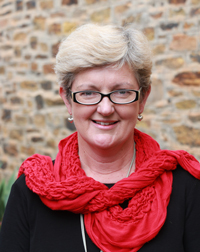 Building a Sustainable Community
Building a Sustainable Community
One of my first goals as a leader of the Early Learner’s Centre was to create and build a sustainable community. Recognising that this job entailed far more than one person, I created a group that held its identity as The Friends of ELC. Inspired in these early times by my research on the value a community plays in the partnership of educating young children, I was determined to find ways of reaching out. The concept of The Friends of ELC was established around working together with families to invite and include more families into the life of the ELC. Early childhood represents a period of time where families create new communities as their children enter a social dynamic and potentially form friendships for life. I wonder sometimes, as we reflect on our journey, if we give enough value to what we have created.
It is a privilege for me to work each year alongside a dedicated group of volunteers whose primary goal is to build a strong community in the ELC. Together, we think of ways in which to welcome new families, bring our community together and offer opportunities for families to be involved in their children’s learning. It is also important to have parent voice in our ELC and often I use this group as a means of getting feedback about new initiatives and plans. We also like to reach out beyond just the parent group into the wider community group and over time have had grandparent representatives on our committee. Like everything, the group and its operations have evolved but the essential reasons for establishing the group have remained at its core.
2016 Friends of ELC
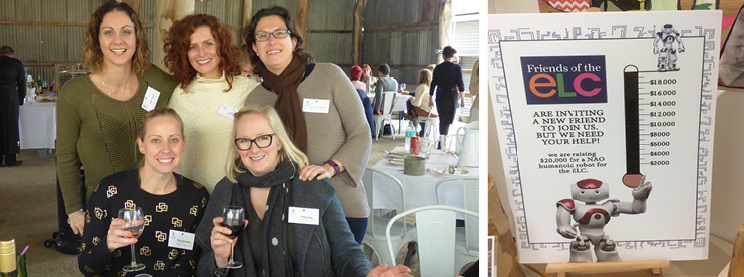
With an exceptional committee, 2016 has been an extraordinary year. The group decided to fundraise for a robot, inspired by the incredible ground-breaking work that was already occurring in the Hallett Room. Last Friday we reached our goal! We raised enough funds to pay for the robot. St Peter’s Girls Principal Ms Shea then announced that the school would pay for the programming which meant we could go ahead with our order. We have ordered a red robot, yet to be named, due to the incredible fund raising of the ELC community. It is because of this united effort we have been able to achieve our goal ahead of target. This means that all of the 2016 children in the ELC will benefit from the robot. We are continuing in our training of ways in which we can utilise a robot to its potential. We already know that our work is ground breaking and that no other ELC to our knowledge has their very own robot.
I still remember the meeting when one of our mums said “We may as well aim for the stars”. I felt empowered by the energy and enthusiasm of the committee and knew that our community would support to the best of their ability. Although its chief aim is not to raise money, the Friends of ELC love to support the teaching and learning program and where possible provide for things that may be otherwise out of our reach. I am truly amazed at how quickly we have raised the funds for our robot. The sense of achievement felt by our community will also be a highlight, recognising that as a team we can achieve great things and indeed aim for the stars!
We will await the excitement of naming it (her) and will advise you of progress news. Thank you to everyone who has supported us in this project. We are creating a learning environment that is already ahead of its time!
I would like to thank the energy of the 2016 Friends of ELC but also acknowledge the hard work of the many groups before them. A legacy has been left by each of these groups; their energies and passion for community have also been strong and determined. It has become very evident that the importance of giving time on a committee is highly valued. Time and advocacy for the cause ignites passion in others. Each group has enabled me to be even more in touch with my community and think beyond the walls and space of the ELC grounds. The initiative of the very first group in 2009 has lived on and I am indeed extremely proud to have been part of every group that has left their significant trace on the life at ELC.
Kate Mount
Father’s Day Breakfast
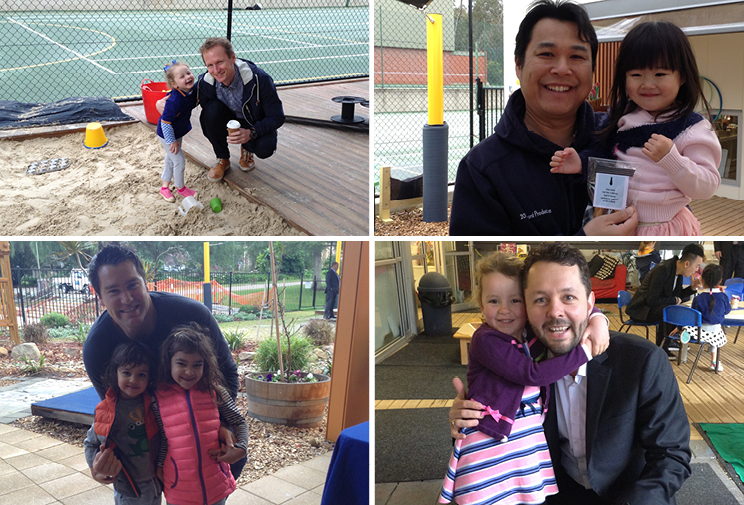
As always our Father’s Day breakfast was a very special occasion. It is one of the favourite events on the ELC Calendar. Thank you to everyone who attended. The children baked special chocolate chip cookies to give as gifts and the dads were spoilt with fruit platters, croissants and coffee from the Saints Girls Café. We know that they would have loved all the special attention. We wish all our fathers and grandfathers a very happy Father’s Day on Sunday, and hope that you are spoilt by your beautiful children!
Click here to view some photos from today.
ELC Staff Leading the Way
Frequently our teachers are asked to present at conferences. We have a wealth of knowledge amongst us. I thought it was important that I share with you some of the sessions that are being presented and by whom.
This week Sarah Crosten- Melling presented at the 2016 Numeracy and Literacy Expo entitled ‘Bringing out the Best!’ Her workshop title is: ‘Re-positioning technology as a social connector – introducing a humanoid robot to an early years program’.
In this workshop Sarah shared our journey as we introduced a humanoid robot to our four and five year-old children. She explained the way in which this technology has enhanced our children’s literacy, numeracy, leadership and inquiry skills as well as the way it brings children together and enhances their social skills. As the children form early understandings of coding and ways in which technology can be used we are challenged to re-imagine our teaching methods and pre-conceptions of how children learn.
Kirsty Porplycia and I are co-presenting at AISSA’s Giftedness in Early Childhood Workshop. This workshop will cover open ended tasks with the inquiry curriculum, differentiated groupings and successful strategies, explicit and creative problem solving and independence as a learner and the ability to be reflective. We will focus on our current successful practice with the use of resources such as the Humanoid robot, Ferguson Park as well as our school resources for example Ms Becca Burton Howard our EDGE specialist and Ms Melissa Bray our eLearning Integrator.
It is an honor to be asked to present at conferences and workshops and have the opportunity of sharing our wonderful work with others.
Kate Mount
Vacation Care
Please find attached the booking form for upcoming Vacation Care. Please note it commences on Tuesday October 4 as the Monday is a public holiday.
Parent Teacher Conversations
Next week we will be opening up bookings for Parent Teacher Conversations from Monday 19 September to Wednesday 21 September. Fifteen minute timeslots will be available for families to book. Each teacher will be available for times both during the daytime as well as some late pm times. I ask that you try, where possible, to fit in with the times offered as rescheduling times can be very difficult for my team.
An email will be sent early next week with the available times of each teacher and an email to make your booking. Alternatively you can book directly on the sign in sheet in each room.
Kate Mount
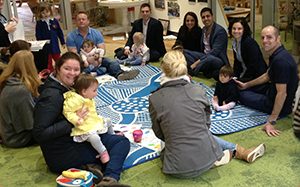 Magic Moment
Magic Moment
Dad’s come to Playgroup to celebrate Father’s Day!
News from the Stonyfell Room
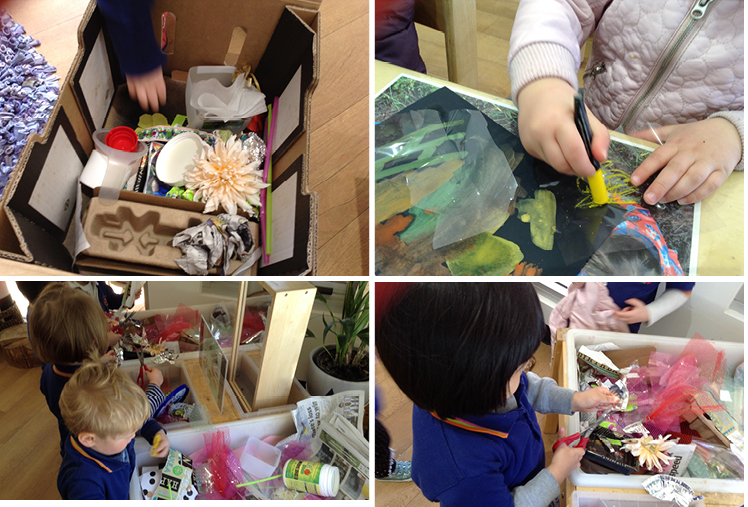 Exploration and investigations using recycled materials; finding the beauty in the ordinary
Exploration and investigations using recycled materials; finding the beauty in the ordinary
Over the past week the Stonyfell children and educators have been shifting our inquiry focus from our explorations of our home and creating the connection from home to ELC to having a more ecological focus. We have begun to introduce the use of recycled materials in many areas of the room. We are wanting our children to explore the endless possibilities and the creativity that can come from exploring a wide range of materials in new ways.
We have introduced box construction and a sensory tray full of open-ended materials. These have encouraged our children to make something new from something that we may have just thrown out. We have paired this experience with a range of art materials that allow the children to create and use their imagination. We have observed the children mixing materials in ways that we had not thought of. We have seen the creation of rockets, spaceships, robots, and castles. The children have been cutting, gluing, drawing and painting; altering the original state of these materials and transforming them into beautiful works of art. We have valued these by displaying them as well as celebrating and sharing them with our peers and educators.
Allowing our children the time and creative freedom to repropose and make beautiful creations allows us to have firsthand experience that we can transform unwanted materials into something new. This process is building our ecological focus, we are beginning to understand that we don’t have an infinite amount of resources and that we need to take responsibility to care for and respect what we have.
We have begun to use the term recycling with the children and many of them have expressed that they know that their mum and dad recycle at home. Over the coming weeks we will be exploring this concept more and supporting our children to practice what they have learnt.
We would like to invite our families to participate in our inquiry by bringing in any recycled materials you may have at home such as:
- Boxes
- Plastic containers
- Bottle tops and lids
- Ribbon, wrapping paper etc
- CD’s
This would help us greatly as the more resources we have the more we can be exploring and discovering. We just ask that all materials that are brought in are cleaned and safe for us to use.
Laura Reiters
News from the Bell Yett Room
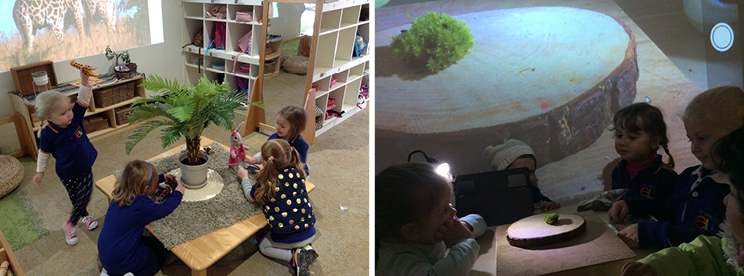
We are very fortunate at St Peter’s Girls’ ELC to have access to a wide range of resources. Technological tools, including iPads, interactive tables and boards, projector screens and more, support our children in developing the skills needed to be a learner in the digital age. This is going to be enhanced immensely with the addition of our newly acquired robot, giving children greater opportunities to discover how technology works and how to create it, not just how to use it. In the Bell Yett Room we have been challenged by the idea of providing children with digital landscapes that offer open ended potentials, supporting the deep and creative thinking we know our children are capable of.
When I was in Reggio Emilia, I took a great interest in how technology was used in their learning environments and have been inspired to use our resources to offer the children new lenses through which to engage with our inquiries. You may have noticed the images of wild animals we have had projected on our screen as a backdrop to the children’s play with our wild animal figures. Combined with the books we have shared, these images have created a desire in the children to engage with the animals with a stronger emotional narrative, enhancing our understanding of our central idea – People are connected to their planet.
Another resource we are privileged to have is the support of specialist teachers. Miss Casson visits us for an Art lesson each Wednesday. This gives the educators the opportunity to work alongside an expert, developing their skills and then offering the same experiences to all the children throughout the week. Working together, Miss Casson and the Bell Yett Team, have explored the use of digital technologies in the light room to enhance the children’s memories and developing relationships with Ferguson Park, the children have journeyed through the park and returned with small collections of natural materials to explore further. Using light and shadow, mirrors, an iPad and our screen the children have been able to not only construct relationships between different tools but also a strong relationship with the natural environment.
Since my return from Reggio Emilia I believe our play room has become a relationship of interconnected spaces – thoughtfully planned learning environments that invite children to engage through play, Ferguson Park where they can learn not only about nature but with nature and in nature and ateliers that offer an endless possibility of languages for processing and sharing their developing understandings. We have begun to view technology as more than just a tool but rather as another language, a language that does not orient us in a single direction but rather enables us to investigate the same concept form different points of view. As our children are immersed in this environment, their explorations provoke wonder, marvelling and curiosity, stimulating creative thinking and deeper investigations.
Leanne Williams
News from the Ferguson Room
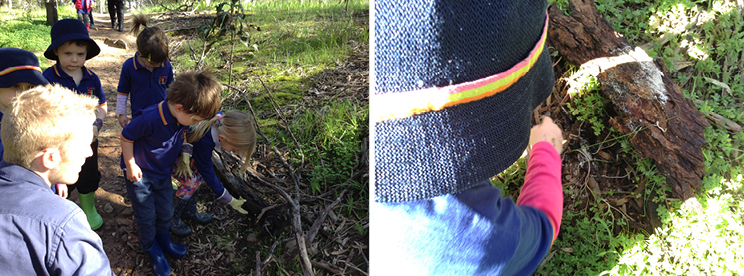
“We are not the leader in the park, the pathway is the leader” – Ruby
One of the exciting things for us as educators is seeing our inquiry focus take affect across the room. Introducing our Central Idea of people are connected to their planet it is at this point of the term where the children’s ideas become stronger and more apparent in their actions throughout the day. Our pathway dilemma in Week 3 (please refer to our last edition of ELC news) provided us with the provocation for looking at direction and movement and wonderings about landmarks, places and things we are connected to. Incorporating digital technologies to provide new perspectives was an added benefit for our location and transformation numeracy focus as we watched Liam’s drone in action. We watched it fly above the park and around us and then excitedly watched the footage on our interactive screen,
“It’s like we’re a bird looking down!”
With the drone footage we have explored the areas of the park, mapping out the way to different landmarks. Adding photography as a way to map a route has also enabled the development of positional language in context.
Very naturally, our interest in the pathways brought light to the importance of remaining on the paths when walking in a conservation park:
“We must stay on the paths or we will stand on millipedes!”
“And the baby plants”
“And the spider orchids!”
“Or the fairy dust!”
“We might make snakes angry if we walk in the grass”
The development of the skills and attitudes as part of the inquiry shine through. Through their connection to their world, the children have demonstrated their empathy for the things around them – the millipedes, the bees, the plants and each other. How they cooperate and work together becomes stronger as they establish links of cause and effect.
As we enter Week 6 of the term, the children are at the point of taking action. They realised that there is no pathway from the ELC to the first path in Ferguson Park. Already we have had some suggestions on ways to create a path and are excited to test some of these theories this week. We hope you are hearing about some of our ideas at home and that you share with us the development of our inquiry for the remainder of the term.
Pam Foden
News from the Hallett Room
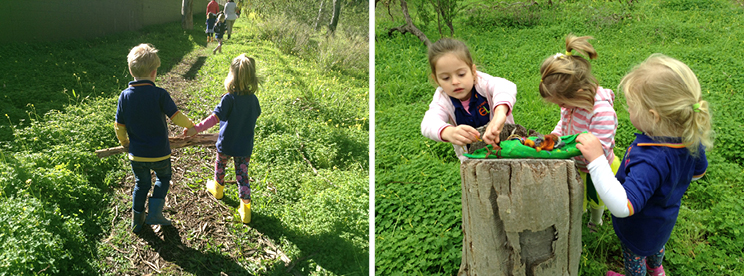
You may have heard your child singing, ‘We are all connected’ as they play. This song has become very popular in our room in the last few weeks. It is about a little girl who decides to make up a song and dance that can be shared across the world to connect people in different countries. You may like to look at this youtube clip with your child at home:
As part of being an International Baccalaureate learner it is important that we expose children to global perspectives. This helps the children begin to understand that their world is part of a very large world and that our local community is connected to the global community.
We have begun to delve into our second line of inquiry, Our connection to the planet. Through our exploration and discussions, the children are beginning to notice the impact that their actions can have on our planet. For example, when walking in Ferguson Park, we have had a number of discussions about whether we should take nature from the park back to the ELC.
Matilda Purvis, ‘You can’t pick flowers because if you do, they can’t grow.’
Matilda Priebe, ‘And the bees need them.’
Phoebe R, ‘I took a picture of them because they were so beautiful.’
Indea, ‘She didn’t pick them because there isn’t many of them.’
The children understood the impact of their actions on the flowers, but what about sticks?
Isabelle, ‘Birds need the sticks.’
Indea, ‘To make a nest.’
Lola B, ‘Yes, when it is on the trees it helps to make the bird’s nest. The birds need privacy and they use the leaves as curtains.’
Ishana, ‘I think you can take sticks if they are on the ground because the birds won’t see them.’
Phoebe R, ‘Yes, because they are on the ground.’
These discussions have provoked an interest in animal homes where the children are finding out about what animals use to make their home. They have found that some animals might use the fallen logs and sticks on the ground. The children have shown great empathy for the environment and are very caring and respectful of nature in Ferguson Park. We can see that they are beginning to notice that their actions can have an effect on their environment, which is a key concept that we are exploring at the moment (causation).
We look forward to seeing the children become more proactive in taking care of their environment as they gain greater understanding of how we share the planet.
Sarah Croston-Melling

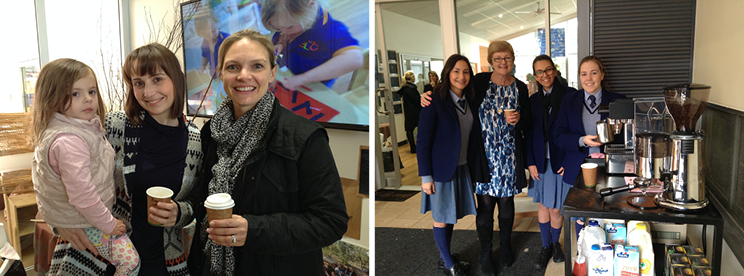
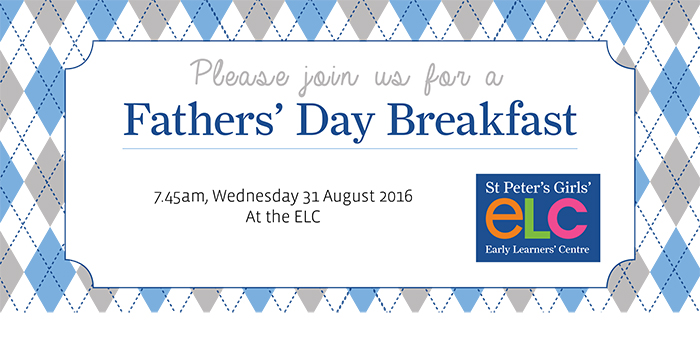
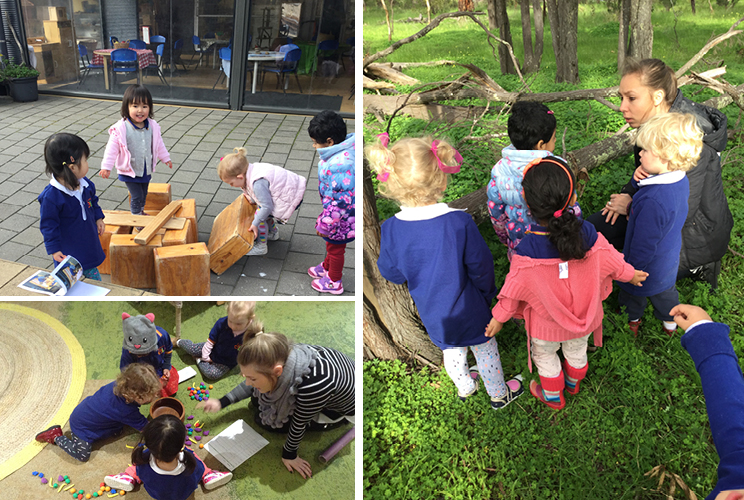
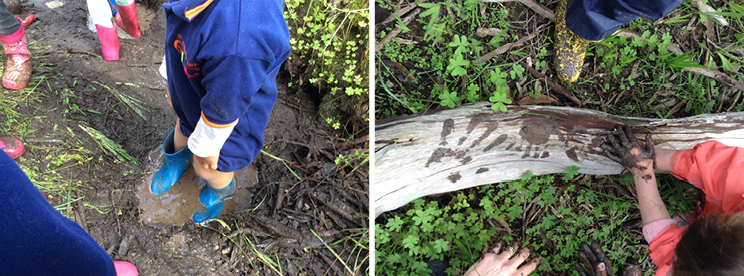
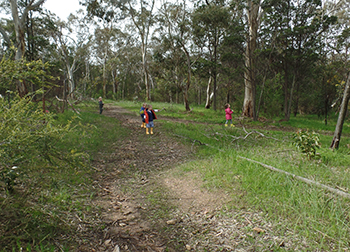 week we have utilised the space for our mud explorations and many walks. An exciting experience for us recently happened during a walk through the park. Our focus as educators was to encourage the children to work collaboratively on where they wanted to go. We listened with all of our senses to what the children were connected to, any causation theories they had and cooperation attitudes that were visible.
week we have utilised the space for our mud explorations and many walks. An exciting experience for us recently happened during a walk through the park. Our focus as educators was to encourage the children to work collaboratively on where they wanted to go. We listened with all of our senses to what the children were connected to, any causation theories they had and cooperation attitudes that were visible.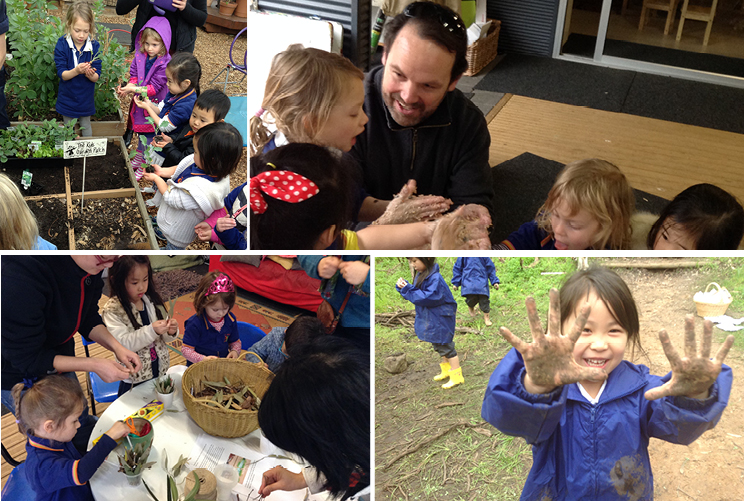
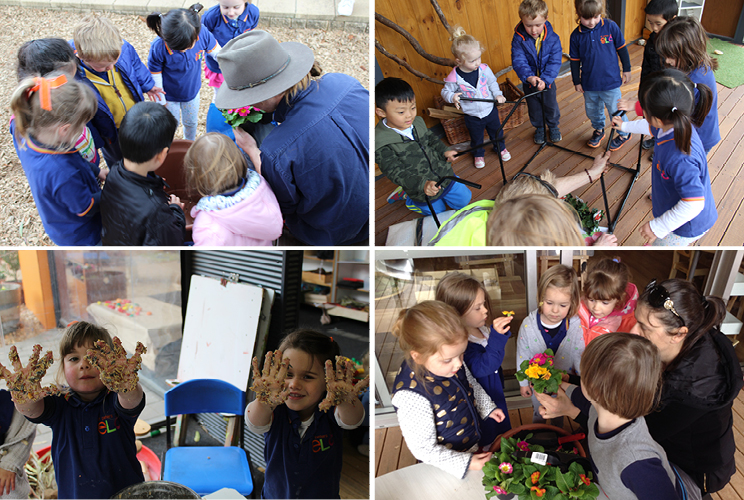
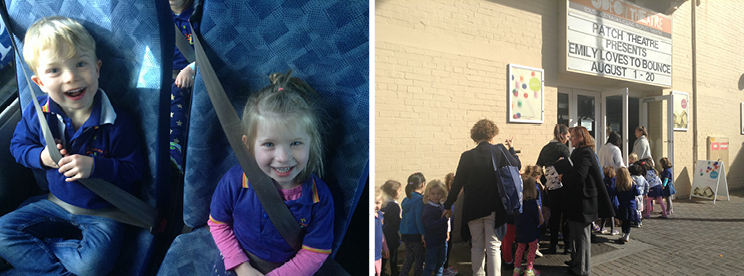
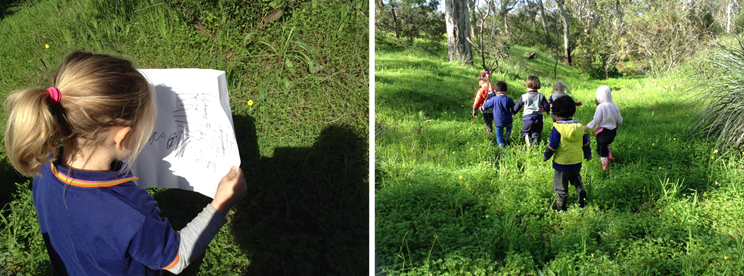
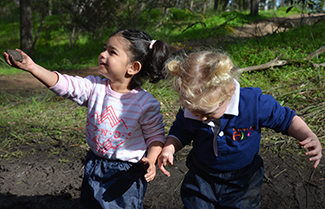
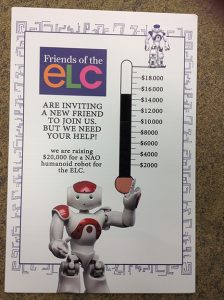
 Yes, you read this correctly. We are going to be creating a new mud kitchen specifically designed for messy play. Fitted out with protective clothing, the children will have the opportunity to mix, splosh, invent and experience mud firsthand! With the help of Liam from Property Services you will see our Mud Kitchen being installed over the next couple of weeks. Much research was done to plan and create this place for creativity and sensory wonder!
Yes, you read this correctly. We are going to be creating a new mud kitchen specifically designed for messy play. Fitted out with protective clothing, the children will have the opportunity to mix, splosh, invent and experience mud firsthand! With the help of Liam from Property Services you will see our Mud Kitchen being installed over the next couple of weeks. Much research was done to plan and create this place for creativity and sensory wonder!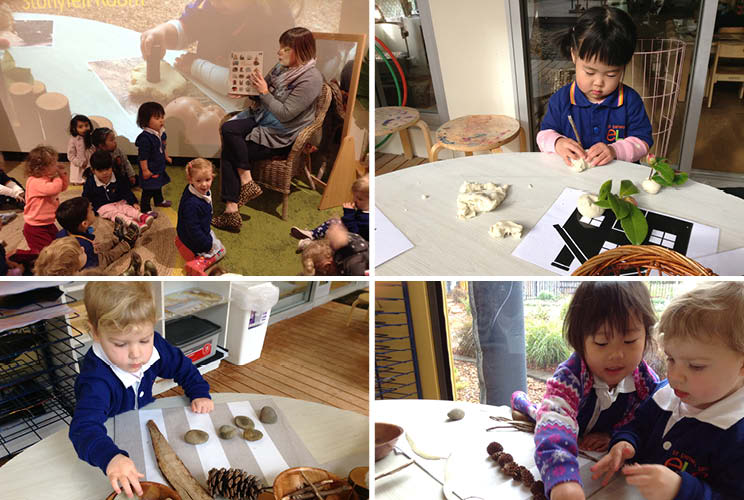
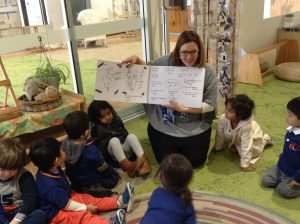
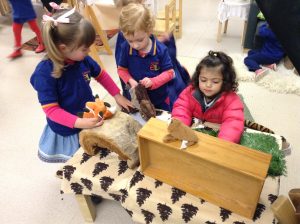
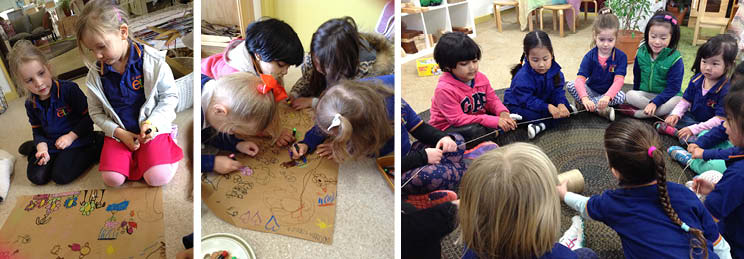
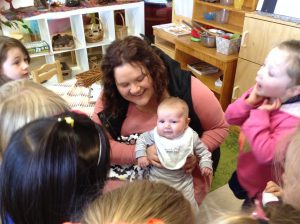 The Hallett children were very excited last Wednesday when Mrs Thomas visited with her new baby, Eddie. Edward Charlie Thomas was born on May 28.
The Hallett children were very excited last Wednesday when Mrs Thomas visited with her new baby, Eddie. Edward Charlie Thomas was born on May 28.